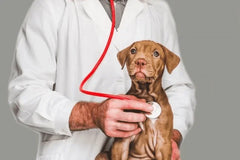
Top Veterinary Medicines for Common Pet Diseases
Pet lovers consider their animals as part of the family and would do everything possible to ensure they are healthy and happy. Pets like dogs and cats have ears, eyes, nose, and throats just like humans and can, therefore, be affected by diseases. Fortunately, in today’s world, many veterinary medications exist that can be used to diagnose, treat, and prevent such diseases. The diseases described in this blog post are the types of diseases our pets can get and the veterinary medicines that make our pets well.
An Introduction to Vet Care and Vet Medicine
Veterinary medicine deals with diagnostics and treatment of animals and can be subdivided into various branches. This includes vaccination, combating worms and fleas, administering routine health checks to the animals, and identifying diseases and their cures. This is made possible through veterinary medicines that come in various forms: tablets, solutions, ointments, and injections based on the type of ailment they intend to treat.
The Rise of Online Veterinary Medicine in India
These Internet services have influenced several aspects of our society, and we cannot escape their influence even in delivering veterinary medicine. In India, pet owners easily access information and materials through online resources. It should be noted that while video consultations cannot replace traditional physical examinations, they can be a great help in preparing for a consultation, in follow-up visits, or in cases when there is a desire to avoid the development of small, banal pathologies. Nonetheless, it is worth knowing that veterinary medicines are intended for use under the supervision of a professional veterinarian.
Common Pet Diseases and Their Veterinary Medicine Solutions
- Skin and Ear Infections: These symptoms are common to dogs and cats. Some of the most evident signs may include itching, inflammation, and pus. Antibiotics, antifungals, and medicated shampoos help control these infections in cats and other pets.
- Fleas and Ticks: Such extractaphiles are inconvenient; their clingy presence can bring itch, discomfort, and maybe even disease. Luckily, there are many vet veterinary products to treat these creatures, special lotions, pills, and even scented collars to ward off these little.
- Gastrointestinal Issues: Gastrointestinal upsets such as nausea and indigestion, loose stool, and vomiting are frequent in all household animals. For more severe cases, the vet might require you to use some medication such as anti-diarrheal drugs, probiotics, or drugs to combat nausea.
- Worm Infestations: Parasites are most familiar, coming as worms, and puppies and kittens are more prone to this problem. These worms and other related parasites are easily eradicated by veterinary medicines, especially dewormers that also block reinvasion.
- Urinary Tract Infections (UTIs): UTIs classically produce symptoms associated with painful or dysuric urinary tract infections and are associated with several complications. Possible courses of action include medical therapies such as antibiotics for bacterial UTIs and dietary modification or supplementation for managing the condition.
- Arthritis: This form of arthritis is less severe and is also seen in senior pets. It may lead to joint pain and stiffness. Veterinary care products, including pain relievers, anti-inflammatory agents, and joint health supplements, help ease the pain and stiffness.
- Eye Infections: Infectious illnesses such as conjunctivitis and other eye infections result in red, watery eye discharge and irritation. Veterinarians recommend medications such as eye drops or ointments to eradicate infection and encourage healing.
- Heartworm Disease: This is a potentially fatal illness spread through mosquito bites. Preventive treatment involves administering medications regularly; however, if the dog tests positive, the veterinarian will prescribe appropriate veterinary treatment to erase the worms.
- Diabetes: This is a long-term disorder that influences glucose balance within the blood. Various treatments, like an injection with insulin, are compulsory for diabetic pets. These treatments help control the blood sugar levels and help the pets live long and healthy lives.
- Kennel Cough/Feline Upper Respiratory Infection: It is caused by highly contagious respiratory viruses that cause coughing, sneezing, and nasal droplets. It is not usually dangerous, but the veterinarian may prescribe a cough suppressant or an antibiotic if the dog feels unwell.
The Importance of Consulting a Veterinarian
Even though the following is a list of some of the best veterinary medicines for minor pet illnesses you can find in the market, it is important not to forget that this information is insufficient and should not replace a visit to the vet. Every pet is unique, and the appropriate medication will depend on several factors, including:
- The particularity of the disease to be diagnosed.
- The age, type of breed, and general health condition of your pet.
- The contracted area of the lungs and the severity of the condition.
- Possible interactions with other drugs that your pet may be under.
Homeopathic Veterinary Medicines: A Different Approach
In homeopathic veterinary medicine, potentized substances are used, replicating the actual disease in a mild form and mobilizing the body’s defense mechanism. Despite a high level of endorsement among owners, the effectiveness of homeopathic veterinary remedies has not been well substantiated by scientific evidence. It is, therefore, advisable to consult a vet before using any other treatment on your pet if it has an alternative therapy.
Conclusion
Becoming a responsible pet owner is about providing your beloved pet with the necessary veterinary services. Consequently, proper health check-ups, vaccination, and controlling of parasites assist in avoiding illnesses. If your pet exhibits any signs of health complications, seek help from your veterinarian as soon as possible. Proper administration of the right veterinary drugs then greatly impacts their rehabilitation process. It is important to note that online resources can provide you with information, but never give your pet any medication on your own. Before taking action regarding your pet, always consult a vet for the right procedure so that your pet will always be in good condition.







